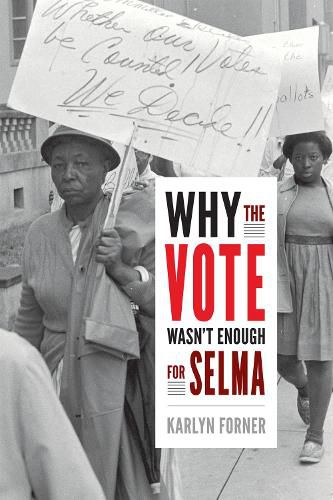Readings Newsletter
Become a Readings Member to make your shopping experience even easier.
Sign in or sign up for free!
You’re not far away from qualifying for FREE standard shipping within Australia
You’ve qualified for FREE standard shipping within Australia
The cart is loading…






In Why the Vote Wasn’t Enough for Selma Karlyn Forner rewrites the heralded story of Selma to explain why gaining the right to vote did not bring about economic justice for African Americans in the Alabama Black Belt. Drawing on a rich array of sources, Forner illustrates how voting rights failed to offset decades of systematic disfranchisement and unequal investment in African American communities. Forner contextualizes Selma as a place, not a moment within the civil rights movement -a place where black citizens’ fight for full citizenship unfolded alongside an agricultural shift from cotton farming to cattle raising, the implementation of federal divestment policies, and economic globalization. At the end of the twentieth century, Selma’s celebrated political legacy looked worlds apart from the dismal economic realities of the region. Forner demonstrates that voting rights are only part of the story in the black freedom struggle and that economic justice is central to achieving full citizenship.
$9.00 standard shipping within Australia
FREE standard shipping within Australia for orders over $100.00
Express & International shipping calculated at checkout
In Why the Vote Wasn’t Enough for Selma Karlyn Forner rewrites the heralded story of Selma to explain why gaining the right to vote did not bring about economic justice for African Americans in the Alabama Black Belt. Drawing on a rich array of sources, Forner illustrates how voting rights failed to offset decades of systematic disfranchisement and unequal investment in African American communities. Forner contextualizes Selma as a place, not a moment within the civil rights movement -a place where black citizens’ fight for full citizenship unfolded alongside an agricultural shift from cotton farming to cattle raising, the implementation of federal divestment policies, and economic globalization. At the end of the twentieth century, Selma’s celebrated political legacy looked worlds apart from the dismal economic realities of the region. Forner demonstrates that voting rights are only part of the story in the black freedom struggle and that economic justice is central to achieving full citizenship.